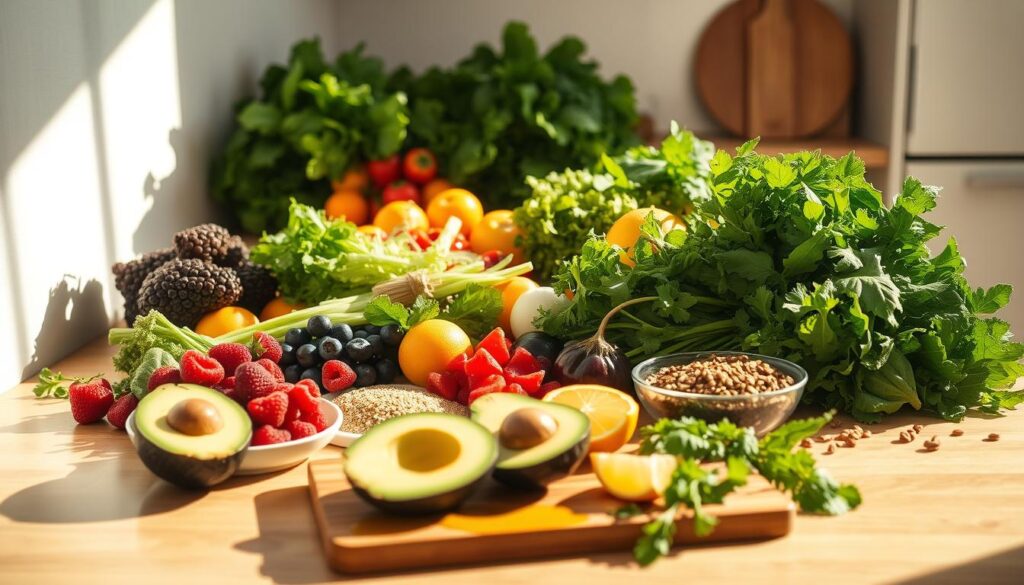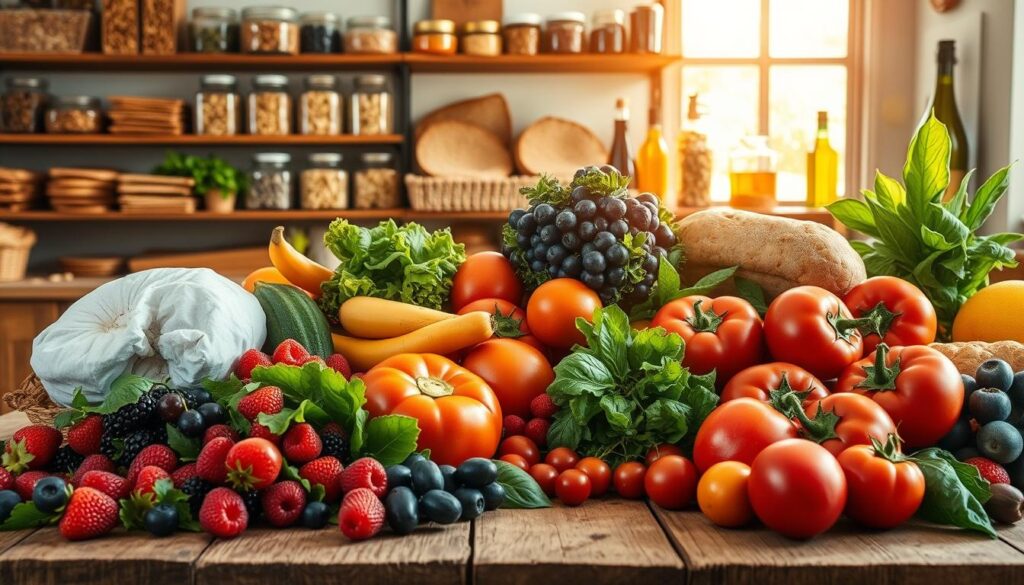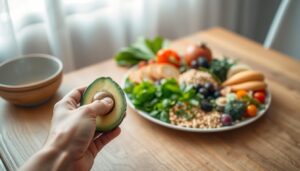As we step into 2025, the spotlight shines brightly on the profound impact of our dietary choices. Research reveals that ultra-processed foods can accelerate skin aging by depleting collagen levels and reducing skin elasticity1. This alarming fact underscores the urgent need to reassess our eating habits, especially considering the intricate links between diet and overall well-being.
Experts like Dr. Elaine F. Kung and Dr. Adrienne O’Connell highlight how certain foods, such as dairy and butter, can influence oil production and skin health. High sugar levels in ultra-processed foods lead to glycation, weakening collagen and elastin, which are vital for skin firmness and elasticity1. This not only affects our appearance but also hints at deeper health concerns.
Consuming ultra-processed foods, laden with refined sugars and additives, can trigger chronic inflammation, accelerating wrinkle formation and premature aging. Trans-fatty acids found in margarine make the skin more susceptible to ultraviolet radiation, potentially damaging elastin and collagen1. These findings emphasize the importance of shifting towards whole, nutrient-rich foods to mitigate such effects.
Key Takeaways
- Ultra-processed foods can accelerate skin aging by reducing collagen and elasticity.
- High sugar intake leads to glycation, weakening skin proteins.
- Experts warn against dairy and butter’s impact on skin oil production.
- Chronic inflammation from processed foods can cause premature aging.
- Trans-fatty acids in margarine increase skin susceptibility to UV damage.
Understanding the Impact of Processed Foods on Health
Processed foods affect more than just our skin; they influence our overall health in profound ways. Let’s explore how these foods impact our skin and gut health.
Effects on Skin: Collagen Loss and Inflammation
High sugar levels in processed foods cause glycation, a process where sugars bind to collagen and elastin, weakening these skin proteins. This leads to wrinkles and sagging skin. Glycation undermines skin integrity, making it less firm and elastic2.
Experts like Dr. Simran Sethi warn about Advanced Glycation End (AGE) products, which damage skin proteins and trigger inflammation. Trans fats in margarine also make skin more susceptible to UV damage, harming collagen and elastin further2.
Gut Health and Systemic Impacts
Ultra-processed foods disrupt gut health by increasing harmful microbes, leading to chronic inflammation. This inflammation affects the entire body, linked to heart disease and diabetes3.
A diet rich in whole foods can restore gut balance, reducing inflammation and improving overall health. It’s crucial to limit processed food intake to protect both skin and gut health.
Expert-Approved Tips for a Healthier Diet in the New Year
Embracing a healthier diet in the new year begins with mindful choices and expert guidance. By focusing on whole, nutrient-rich foods and minimizing processed items, you can create a diet that supports both your skin and overall well-being.
Choosing Minimally Processed Alternatives
Nutritionists like Jamie Maitland and Catherine Gervacio recommend opting for minimally processed foods to reduce exposure to harmful additives. “Minimally processed foods retain more of their natural nutrients and are less likely to contain artificial ingredients,” notes Jamie Maitland. Consider alternatives like hempseed powder or organic, grass-fed whey protein for a healthier boost4.
When shopping, learn to read food labels to identify hidden sugars and additives. Look for products with fewer ingredients and avoid those with unfamiliar chemical names. For example, replace sugary cereals with fresh fruit or choose almond flour over refined white flour for baked goods4.
Keeping Added Sugars and Harmful Additives at Bay
“The key to a healthier diet is avoiding foods that spike insulin and cause inflammation,”
advises Catherine Gervacio. This includes limiting sugary snacks and ultra-processed protein bars. Instead, incorporate natural sources of protein and healthy fats, such as chia seeds or flaxseeds, into your meals4.
Remember, small changes can make a big difference. Swap margarine for natural oils like coconut or avocado oil, and be mindful of trans-fatty acids, which can harm skin and heart health5. By focusing on real, whole foods, you protect your gut and skin while enjoying lasting health benefits.

Nourish Naturally: Ditch Processed Foods for Your Best Health in 2025
Embracing whole, unprocessed foods is a powerful step toward a healthier, more vibrant you in 2025. By focusing on nutrient-rich ingredients, you can support your body’s natural functions and enhance your overall well-being.
Health Benefits of Embracing Real, Whole Foods
Whole foods are packed with essential nutrients that support collagen production and skin elasticity, helping to maintain a youthful appearance1.
They also provide antioxidants and fiber, which promote gut health and reduce inflammation, linking to better heart health and a stronger immune system1.

Diets rich in fruits, vegetables, and lean proteins have been shown to preserve skin firmness and reduce the signs of aging1.
Implementing Everyday Changes for Lasting Results
Start by replacing sugary cereals with fresh fruit and choose natural oils like coconut or avocado oil instead of margarine1.
Incorporate chia seeds or flaxseeds for a boost of healthy fats and protein, supporting skin and heart health1.
Small changes, like swapping refined flour for almond flour, can make a big difference over time1.
| Food Type | Benefits | Examples |
|---|---|---|
| Whole Foods | Rich in nutrients, supports collagen, and reduces inflammation | Fruits, vegetables, lean proteins |
| Healthy Oils | Supports skin health and provides essential fats | Coconut oil, avocado oil |
| Seeds | High in protein and healthy fats | Chia seeds, flaxseeds |
Top Foods to Avoid for Optimal Skin and Heart Health
When it comes to maintaining healthy skin and a strong heart, certain foods can undermine your efforts. Experts like Dr. Adrienne O’Connell and Robyn Newmark highlight the negative impacts of specific dietary choices. Here’s a closer look at the culprits and why they should be avoided.
Butter, Margarine, and Sugary Cereals: A Closer Look
Butter and margarine, while tasty, can lead to excess sebum production, contributing to oily skin and potential acne. Margarine, in particular, contains trans fats, which increase skin susceptibility to UV damage and harm heart health6.
Sugary cereals are another offender. They trigger glycation, a process where sugars bind to collagen and elastin, weakening these skin proteins and leading to wrinkles. This effect is compounded by the high glycemic index of refined flours, which can cause rapid blood sugar spikes7.
Energy Drinks and ‘Natural Flavors’ Explained
Energy drinks are often loaded with sugar and artificial ingredients. A single serving can contain up to 80 grams of sugar, equivalent to 20 teaspoons, increasing the risk of obesity and heart disease7. Additionally, the so-called “natural flavors” in these drinks can include hidden sugars and additives that further exacerbate inflammation and skin aging.
| Food Type | Why It’s Harmful | Examples |
|---|---|---|
| Butter and Margarine | Contain saturated fats and trans fats that harm skin and heart health | Butter, margarine |
| Sugary Cereals | High in refined sugars, leading to glycation and inflammation | Frosted flakes, sugary granola |
| Energy Drinks | High sugar content and artificial additives that cause inflammation | Energy drinks, sports beverages |
Avoiding these foods is crucial for protecting your skin and heart. Opt for whole, nutrient-rich alternatives to support your overall well-being and maintain a vibrant, healthy appearance.
Additional Nutrition Insights from Leading Experts
As we explore the latest trends in nutrition, experts like Jamie Maitland and Catherine Gervacio offer valuable insights into making smarter dietary choices. Their advice focuses on avoiding ultra-processed foods and opting for whole, nutrient-rich alternatives.
Protein Bars, Shakes, and Ultra-Processed Alternatives
Many protein bars and shakes are highly processed, containing artificial additives that can harm your health. Nutritionists warn that these products often have high sugar content and low nutritional value8.
Instead of relying on these convenience products, consider whole food options like chia seeds or flaxseeds, which provide natural protein and healthy fats8.
Smart Swaps and Real Food Options for Balanced Meals
- Replace sugary cereals with fresh fruit for a natural energy boost.
- Choose natural oils like coconut or avocado oil instead of margarine.
- Incorporate seeds into your meals for added nutrition and texture.
These simple changes can make a significant difference in your overall health and energy levels.
Seasonal Advice: Preparing for a Healthier 2025
Planning ahead is key to maintaining a healthy diet. Experts recommend meal prepping with whole foods to avoid reliance on processed options8.
Consider seasonal produce and incorporate it into your meals for variety and optimal nutrition.
By focusing on real, whole foods and avoiding ultra-processed alternatives, you can achieve a balanced diet that supports your overall well-being. Remember, small changes today can lead to a healthier tomorrow.
Conclusion
In 2025, the focus is on making informed dietary choices that prioritize long-term well-being. Research underscores the negative impact of ultra-processed foods on skin health, gut balance, and overall wellness9. These foods accelerate skin aging by reducing collagen levels and elasticity, while also triggering chronic inflammation that can lead to serious health issues.
Embracing whole, nutrient-rich foods offers numerous benefits. These foods support collagen production, provide essential antioxidants, and promote gut health, all of which are vital for maintaining a youthful and healthy appearance10. By focusing on whole foods, individuals can mitigate the harmful effects of processed alternatives and enjoy lasting health benefits.
Experts recommend actionable steps for dietary change. Start by replacing sugary cereals with fresh fruit and choose natural oils like coconut or avocado oil instead of margarine10. Incorporating seeds like chia or flax provides a boost of healthy fats and protein, further supporting skin and heart health. Small changes, such as swapping refined flour for almond flour, can make a significant difference over time.
Looking ahead, committing to a diet rich in whole foods is key to achieving better health and longevity. By making informed food choices, individuals can protect their skin, support gut health, and enjoy a vibrant, healthier life11. The time to act is now—start your journey towards a balanced diet today for a brighter, healthier tomorrow.
FAQ
What are ultra-processed foods, and why are they a concern?
How does sugar intake affect the body and skin?
What role does fat play in a healthy diet?
Can protein bars be a healthy choice?
How can I improve my gut health through diet?
What are the benefits of reducing ultra-processed food consumption?
Are energy drinks a good source of energy?
What are some smart swaps for processed foods?
How can I stay consistent with a healthier diet in the new year?
Source Links
- 2 Processed Foods To Ditch In 2025 Because They Lead To Collagen Loss – https://www.yahoo.com/lifestyle/2-processed-foods-ditch-2025-133024079.html
- Ultra-Processed Foods: What You Need to Know – https://zoe.com/learn/what-is-ultra-processed-food
- Are Ultra-Processed Foods Making You Age Faster? Here’s What The Science Says – https://www.aol.com/ultra-processed-foods-making-age-172800907.html
- Make your meals healthier with these 9 simple dietitian-approved food swaps – https://www.today.com/health/diet-fitness/healthy-food-swaps-dietitians-rcna187166
- Dietitians Say These Are the Best Diets for Weight Loss in 2025 – https://www.aol.com/dietitians-best-diets-weight-loss-181000358.html
- Best Foods to Eat for Gut Health – https://www.eatingwell.com/article/2059033/best-and-worst-foods-to-eat-for-gut-health/
- 15 Foods Doctors Want You to Stop Eating for a Healthier Diet – https://www.aol.com/15-foods-doctors-want-stop-200800104.html
- Top 10 Food and Nutrition Trends on the Horizon for 2021 – https://www.healthline.com/nutrition/food-and-nutrition-trends
- Avoiding Ultra Processed Foods on a Vegan Diet – https://viridian-nutrition.com/blogs/nutrition-articles/avoiding-ultra-processed-foods-on-a-vegan-diet
- Should we be worried about vegan ultra-processed foods? – https://www.bbc.com/future/article/20241011-what-explains-increasing-anxiety-about-ultra-processed-plant-based-foods
- Governance and resilience as entry points for transforming food systems in the countdown to 2030 – Nature Food – https://www.nature.com/articles/s43016-024-01109-4




